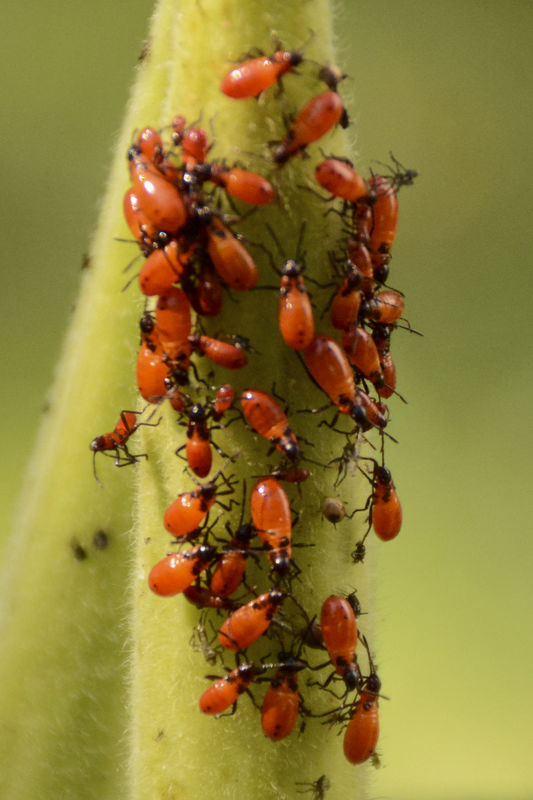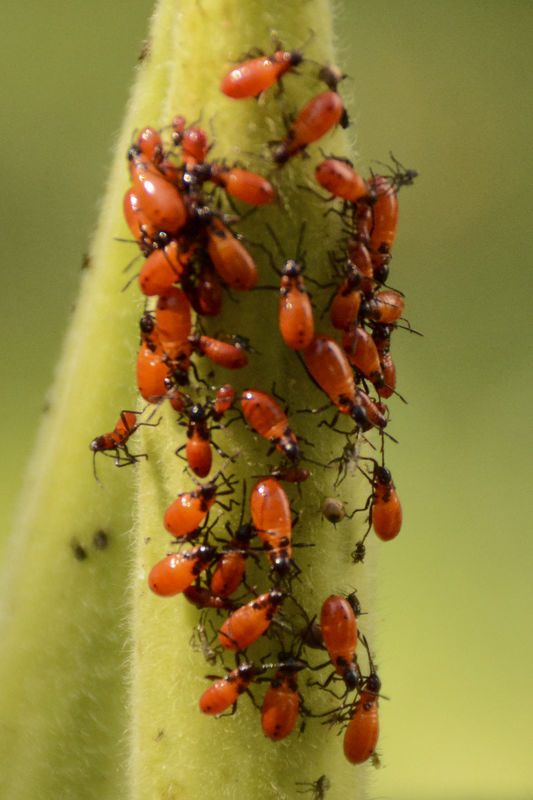Aphids, Milkweed & Baby Monarch Caterpillars... Advice Needed...
Aug 11, 2017 19:22:02 #
angela k wrote:
Corky, mine are orangy color also and big and juic... (show quote)
Guess what, Angela--I found the same thing on our butterfly weed this morning and was a first for me also and have been waiting for you reply to let you know what was happening to us, not knowing that you were having the same problem. I googled and found out that they are Swamp Milkweed Beetles and upon hatching will immediately start eating and doing much damage to the milkweed. I will add an attachment that I took from some newly hatched ones this morning and the larger beetle that you found the cat in it mouth is bad news also. The article said that this larger beetle will even feed on the chrysilas and I have seen several of these larger beetles over the years!
Aug 11, 2017 19:35:53 #
Swamp-Cork wrote:
Guess what, Angela--I found the same thing on our ... (show quote)
Eeeeewwww..... now these gave me the creeps, but thankfully this is not what was on my plant. The one I killed looked more like a stink bug, but with different coloring. I've seen these milkweed bugs on other plants in my yard, but in the adult stage, I didn't know they do that much damage!! I hope you killed the ones you found and use the squishing method to kill the aphids... but wear rubber gloves!!
Thanks for this info, Corky and good luck with your pests!!
Aug 12, 2017 07:21:33 #
angela k wrote:
Eeeeewwww..... now these gave me the creeps, but thankfully this is not what was on my plant. The one I killed looked more like a stink bug, but with different coloring. I've seen these milkweed bugs on other plants in my yard, but in the adult stage, I didn't know they do that much damage!! I hope you killed the ones you found and use the squishing method to kill the aphids... but wear rubber gloves!!
Thanks for this info, Corky and good luck with your pests!!
Thanks for this info, Corky and good luck with your pests!!
Thanks Angela. and hope your little ones make it to become beautiful Monarchs! While I was bug investigating yesterday I found out that a disease called Milkweed Yellows was what caused four of our seven mature swamp milkweeds to die this season. It is spread from an infected plant to the other by small leafhoppers, and is quite contagious so any infected plants should be dug up, bagged and disposed of. We had planted six very small common milkweed plants this year and before they had reached more than about a foot or so high the monarch cats had pretty much defoliated them, and now four are trying to put on new growth but pretty sure that the best looking one of the group may have the Yellows disease! Oh well, we have had a few beautiful Monarchs this summer and almost certain several of the just about perfect ones hatched here. Looks like we are in for a rainy day and really can use the water. Hope that you guys have a great day!

Aug 12, 2017 17:25:17 #
Swamp-Cork wrote:
Thanks Angela. and hope your little ones make it t... (show quote)
Oh My!!! Who would think an ordinary weed could get a contagious disease... that's crazy and sorry that four of your plants died!! I did go out this morning to check on my two plants and found a few more aphids... I squished those little suckers!! The cats that I have isolated, seem to be doing well, some are really small, about the size of a pin head, but they've been munching away and there was plenty of droppings to prove it!!
Corky, the monarch has visited my garden every day and I yesterday I spotted her, or another one, depositing more eggs!!! So this should be interesting to see what happens!
I'm glad they've been visiting you as well.... if they don't eat all my pods, would you like some of the seeds from my swamp milkweed?? I promised some to Donna and Corolyn, but it all depends on these hungry buggers, hoping they leave the pods alone!!
It rained during the night and today turned out to be nice, but tomorrow will be even nicer!! Going on a Dahlia shoot tomorrow with my friend if they're in bloom!!
Take care and say hi to Ellen and Bella from me!

Aug 16, 2017 23:37:42 #
I know a fair amount about insects. My advice is to just leave the aphids. Why? They can attract ants that feed on the sap secreted by the aphids. These protective ants can be a deterrent against parasites that would lay eggs in your monarch caterpillars. It is not a perfect system (parasitic wasps and flies might come anyway), but any bit helps. The aphids will not do the milkweed plant significant harm in any case.
Aug 17, 2017 06:45:14 #
Mark Sturtevant wrote:
I know a fair amount about insects. My advice is to just leave the aphids. Why? They can attract ants that feed on the sap secreted by the aphids. These protective ants can be a deterrent against parasites that would lay eggs in your monarch caterpillars. It is not a perfect system (parasitic wasps and flies might come anyway), but any bit helps. The aphids will not do the milkweed plant significant harm in any case.
Thanks Mark for this info.... my cats are safe and I didn't really have many aphids, so all is well!!

If you want to reply, then register here. Registration is free and your account is created instantly, so you can post right away.




